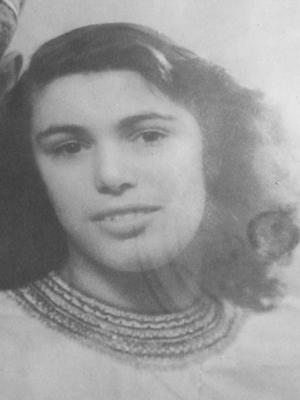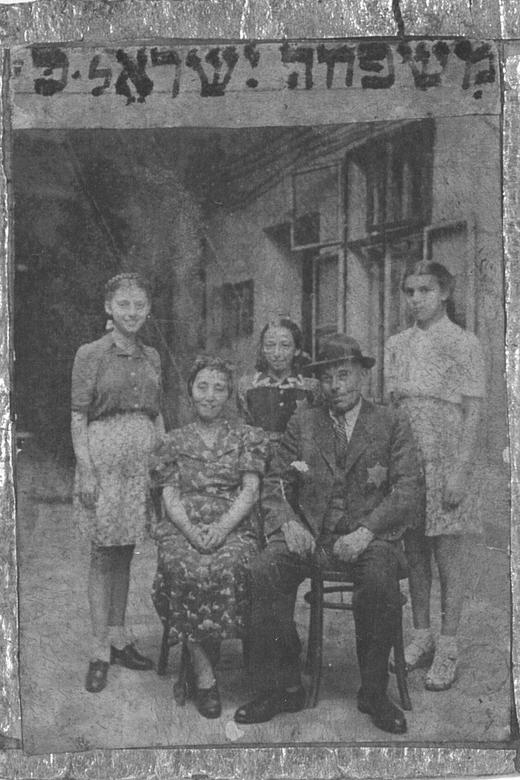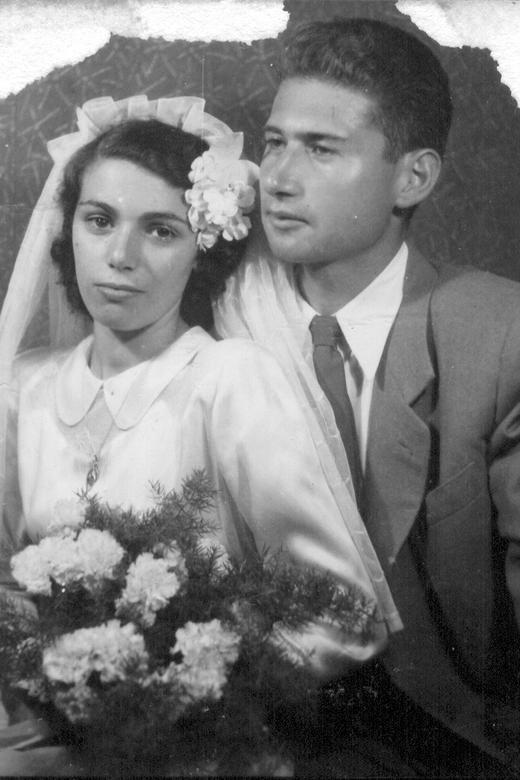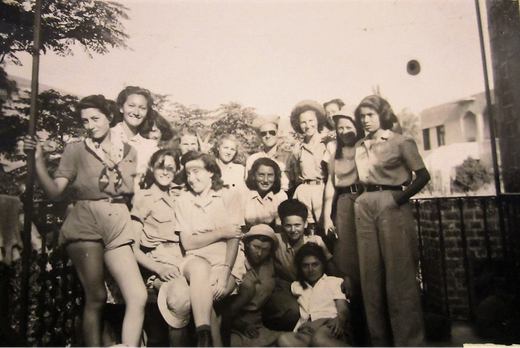Judy Stern

Born: Budapest, Hungary, 1931
Wartime experience: Survival in Budapest
Writing Partner: Frances McKeague
Judy Stern was born in Budapest, Hungary, in 1931. Soon after Germany occupied Hungary in March 1944, Judy and her family were confined in a yellow-star building in Budapest.
After the Arrow Cross regime took over Hungary that fall, Judy and her family managed to move into a building protected from raids and roundups, through family connections. After the war, Judy lived in Budapest until 1948, when she left for Israel. In 1951, she married George Stern, and they settled in Netanya. Judy finished high school, went to teacher’s college, and then taught kindergarten while also raising a family. In 1960, Judy and her family moved to São Paulo, Brazil, where she continued teaching and became a director of a Hebrew school. Judy and her family moved to Los Angeles in 1969 and to Toronto in 1970. Judy’s postwar life with her husband, George, is featured in George’s memoir, Vanished Boyhood (2013). Judy Stern passed away in 2020.
A Lucky Decision
As a little girl I was sheltered from antisemitism because I went to a private Jewish school, but even before the war, I was aware that many gentile Hungarians hated the Jewish people. On Sunday mornings, after Saturday night parties, we often heard people, likely drunk, shouting antisemitic slurs on the streets. Eventually, our parents would not let us go out on Sundays. I heard that Jewish children in public schools experienced antisemitic behaviour from their classmates on a regular basis.
Although the war started in Europe in 1939, some Hungarians didn’t experience the worst of it until 1944. On March 19 of that year, Nazi Germany occupied Hungary, and increased rules concerning the Jewish people soon came into effect. All the Jewish schools were closed, and we had to wear yellow stars on our clothing, identifying us as Jews. By June, we heard on the radio and saw notices on the sides of the buildings that all Jews were to be ordered out of their homes. Then the superintendent of our building told us to leave. Our family was immediately moved to a “yellow-star” house, a building that had been designated as a residence for Jewish people only. I remember the day we had to leave our apartment very clearly. We left by horse-drawn wagon, with few belongings. Our apartment was then stolen from us. The building we went to was owned by a Christian family, who had to leave to make way for the Jewish families that were being moved in.
One of my cousins, David, a beautiful blond boy, had been studying in Budapest at a Jewish school, and after the occupation, against the advice of my parents, he returned home to the countryside to look after his mother and sisters. Because he was blond, he did not fit the stereotype of Jewish boys, and he left Budapest without carrying papers identifying him as a Jew, so when he was stopped on his way home, the German soldiers let him proceed, not thinking he might be Jewish.
David had offered to take me and my sisters, Klara and Éva, with him, believing it would be safer for us outside of Budapest. He said we would look like peasants, and nobody would know we were Jewish. My mother strongly objected and refused the offer, indicating we would all stay in Budapest as a family. My mother’s decision saved our lives.
The Jewish people in Budapest did not suffer in the same way as those in the countryside. My paternal grandmother, Sarolta Brayer, who was also David’s grandmother, was taken to Auschwitz-Birkenau along with her two daughters and their children, including David. My grandmother and both aunts were murdered or died there. One of my cousins would not leave her mother’s side and they went to the gas chamber together. David was taken to a forced labour camp, where he eventually died of starvation and overwork. His sister, Ella, was taken to work in a munitions factory in Germany and, although a sickly child, she managed to survive the Holocaust and return home after the war. Two of my other cousins survived Auschwitz.
At the yellow-star building, my parents tried to make the environment normal for us. To protect us from hearing about the disturbing events happening outside, they spoke German to each other, which we didn’t understand very well. My mother had brought as many of her preserves and canned vegetables as she could, and we survived on these. She also bought food on the black market. I remember once she bought a large jar of honey but discovered there was a dead mouse at the bottom of the jar. We hated honey and originally were quite happy that we couldn’t eat it. However, a doctor told my mother it would be good if we had two teaspoons a day, as it would assist in keeping us healthy. There were so many food shortages that we ate that honey. Because we had been allowed to take so little from our home, my mother had arranged for most of our belongings to be stored. In the end, they were all destroyed as a result of the bombings in Budapest.
Once we entered the yellow-star building we were not allowed outside except for a brief two hours a day to get food, and when we did leave the house, we were called “dirty Jews,” and people spat at us.
Both before and during the occupation, Jewish men were taken to the Hungarian forced labour service instead of the regular army, and later on, able-bodied women and girls over the age of sixteen were taken away as well. We could hear the many children left behind who were crying for their parents. My father and older sister, Klara, were taken, but for some reason, my mother was not. She was born in 1899 and was only forty-five years old, but she was spared. My father and sister somehow met up with each other at the same labour camp and were, fortunately, not kept there very long. I really don’t know why they were allowed to come home, but they returned after about two months.
During the bombings, we spent our nights in the basement. It was so scary that sometimes we just wanted to die. It felt like we stopped being children at this young age; we weren’t kids anymore.
Under Siege
The Hungarian regent Miklós Horthy remained as head of the government until October 1944, when power was transferred to the Hungarian Arrow Cross Party, a brutal organization that hated Jews. The Siege of Budapest occurred from December 1944 to February 1945. I remember being so frightened during this time. We were afraid not only because of the way we were being treated as Jews but also because the city was constantly being bombed by the Soviet army. During the bombings, we spent our nights in the basement. It was so scary that sometimes we just wanted to die. It felt like we stopped being children at this young age; we weren’t kids anymore.
One day, my mother told me to go see how my aunt was doing; we didn’t have any telephones and could only check on someone by visiting in person. As I was walking by a school on the way, the kids came out to spit on me and call me a dirty Jew. I was so upset and went home crying. We were hurt mentally and emotionally as well as physically.
Another time I was out and ran into some members of the brutal Hungarian Arrow Cross. They were killing many Jews and treating others with extreme cruelty. They would take Jews to the banks of the Danube River and shoot them, leaving the river full of bodies. There is now a memorial in Budapest along the Danube, a long line of sculptured shoes in memory of those who were murdered.
That day, I fell down and pierced my leg on one of their bayonets. I recall it bled quite a bit but really didn’t hurt that much. There was not much water to clean the injury and no medication available, so my mother treated the wound with some Vaseline. It did not heal well, and after the war I was in hospital for a long period of time. One of the doctors wanted to amputate my leg, but my mother would not consent to it. Another doctor tried a different treatment, and after three surgeries, my leg was saved. I still have a scar.
Near our yellow-star building, on the same street, there was a building in which people were interrogated and tortured. I remember a lot of blood near that building and on the street outside it, and my mother giving me a slap one day for being curious and looking into the windows. She had never hit us children before, but she was cross with me, and desperate to protect me.
The Nazis or the Arrow Cross would often take us away from our building and force us to march for hours, all over the city, just to make us suffer. I would often witness Jewish men being taken away to the forced labour camps with their arms raised. They would be beaten and the street outside our apartment would run with blood. My mother often closed the blinds facing the street so we wouldn’t see.
During the occupation, Raoul Wallenberg, a diplomat from Sweden, helped Jewish people in Budapest by providing them with passport-type papers and safe places to stay. My mother visited the Swedish embassy and received papers for us, which we hoped would improve our situation, but the Arrow Cross tore the papers up.
My mother’s uncle, Mandi Edelstein, was influential in the Jewish community in Budapest. He had been dealing with one of the German Wehrmacht officers and was able to move us out of the yellow-star building. I believe it cost a lot of money. He arranged for us to be moved to a large building that had been a Jewish technical high school before the war and then converted to a hospital for the German soldiers. We lived in that building from late 1944 to when we were liberated. The Germans guarded the entrance, and Arrow Cross members were not allowed in to take anyone. The other Jews in the building, many of whom were professionals — doctors, lawyers, engineers — were forced to make boots and sew uniforms for the German army. There was not much water for the building, but one of the engineers dug around the outbuildings and found a well that provided us with some water during our stay. But we were always afraid while we lived in that building. Even so, my mother taught us our lessons and we did housework to pass the time. We certainly were not lazy.
Sometime in December 1944 I was returning to the building with our supply of water when one of the German guards heard the warplanes coming and told me to lie down in the snow to protect myself. My mother saw all this happening and was so afraid I would be hurt by the shrapnel, but because of the soldier’s actions I was unharmed and returned home unscathed.
Another time, my mother gathered up her jewellery and her fur coat and told me to take them to my aunt, her sister, for safekeeping. We were sure we were going to be killed, and my mother wanted her sister to have these items. My aunt was shocked my mother would do this but took the jewellery and furs anyway. As I was leaving my aunt’s building, I saw Arrow Cross officers with the insignias on their uniforms. I was ordered to halt. I did not have my yellow star on, and they asked where it was. When I couldn’t produce it, they said they were taking me to another building. By this time, I was used to thinking I was going to die so I was not really concerned, just accepting of my fate. We knew that Jewish people were regularly being taken to the Danube and shot, and we assumed the same would happen to us at some point. But instead of taking me away, they took me home. According to my uncle, these men were dressed as Arrow Cross but were really Jews out to protect their community. I still have some of the rings my mother sent with me that day.

A Difficult New Life
In February 1945, the Soviet army was victorious and took over Budapest. The Soviets who came to our building were Jewish, and when they discovered the men acting as guards were actually Jews dressed in German uniforms, they left them alone. Otherwise, they would have taken them away, probably to labour camps or to be killed. The Soviet soldiers knew we were starving and threw bread at us out of large construction trucks. They were nice to us, but there were many in Budapest who were assaulted, and women were raped, though not in our building.
Budapest was really a mess at that time. After the liberation, the ghetto was cleaned up somewhat, and we moved back to our original neighbourhood but not to our previous apartment. It was very hard to find suitable apartments because so many had been destroyed. It took my parents about three weeks to clean our new home and we had few belongings left to make ourselves comfortable. There was hardly any food and people were starving, including the Soviets.
The Jewish community in Budapest received some help from Jewish organizations in the United States, and somehow my father got his wholesale business running again. The Soviets gave him a kiosk where he sold all sorts of household goods.
In the meantime, my sisters had returned to school, and I resumed swimming and became quite athletic. I swam free of charge at the Jewish sports club, but on the weekends I would often go to a pool in a rather elegant hotel and pay a fee. I was the only Jewish girl on the team there, and I felt that the others hated me because I was Jewish. They constantly talked behind my back.
One of the trainers at the Jewish sports club told me I should become a diver. I really didn’t want to dive but he insisted, took my hand, led me up the diving stairs and thrust me off the diving board. That was in 1946, when I was fifteen or sixteen years old. I became quite a good diver, and I won many medals.
I met George Stern, my future husband, at one of the pools. He was friends with a man who lived in our building. George had seen me at the club and had asked his friend about me. The friend advised him to go to the swimming pool, as I was often there. George dove into the water one day while I was swimming, touched my leg and then initiated a conversation. He walked me home after and we began seeing each other.
One cold day in February 1946, after I had finished swimming, I waited for my wet hair to dry before going outside. We didn’t have money for a hairdryer, so it took a long time. George waited for me all that time and then walked me home. He was so patient.
In the summer we often went for walks around the city. Budapest was gorgeous again by then. We continued to go out casually, but after a time we stopped seeing each other. We were just teenagers, and we were going to different schools, so we lost touch.
***
My mother died of a heart attack in 1947. The war had just been too much for her to endure. She was only forty-eight. My sister Éva and I had tried to help her, but we couldn’t. Losing her was unbearable. I remember being with Éva after we had seen that my mother had passed. We were both suffering so much, and it was especially hard for Éva, the youngest, who was so close to our mother. We cried all night, and in the morning went across the street to where my uncle Mandi and aunt Margit were living to tell them. They just couldn’t believe it.
At the time of my mother’s death, Klara had already left home to attend a rabbinical and teacher’s college. The director of the college, Dr. Sándor Scheiber, officiated at my mother’s funeral and attended the cemetery. Even George came to sit shiva with me and my family.
I did not go back to school after my mother died. I wanted to work and make money. Life was extremely hard for us in 1948. My father was a changed man. He had been a high-ranking army officer before the war and was deeply depressed afterward, even more so after my mother’s death. He would complain that the Germans had made us eat dirt and clean toilets. To make things worse, the Communist Party took his business away that year. My sisters encouraged him to remarry, which he eventually did, to a very nice woman.
I was finding postwar life in Budapest to be so difficult. The antisemitic attitudes and behaviour of the other members of the swimming team became unbearable, and I just wanted to leave Hungary and go to Israel.

Judy and George’s wedding. Israel, August 16, 1951.

Judy (far right) with her high school class on military leave. Israel, circa 1949.

Judy and George at the launch of George’s memoir. Toronto, 2013.

